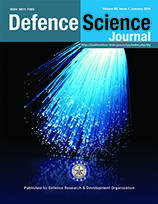Role of Threaded Tool Pin Profile and Rotational Speed on Generation of Defect Free Friction Stir AA 2014 Aluminium Alloy Welds
DOI:
https://doi.org/10.14429/dsj.66.8566Keywords:
Frictions stir welding, rotational speed, aluminum alloy, conical tool pinAbstract
Influence of threads on tool pin and rotational speeds on defect occurrence in friction stir welding (FSW) of aluminum alloy AA 2014 T6 plates has been studied. The effect of FSW forces on the evolution of mechanistic defects, caused in turn through a variation in heat generation during the process has also been examined. In case of conical tool pin, relatively lower rotational speeds resulted in unbounded zones and micro defects while high speeds caused excessive flash, thereby resulting in surface defects and voids inside the weld. The FSW joints were defect-free at moderate speeds, hinting an optimum heat generation and flow. Reaction forces on the tool pin, in the welding direction, were correlated with the defect formation. Tools equipped with a threaded conical pin profile resulted in sound welds, irrespective of the tool rotational speeds in the entire range of 400 rpm - 2400 rpm. The threaded conical pin, with a relatively larger frictional area, may be contributing to higher levels of heat generation compared to a plain conical pin. Further, positive displacement of the hot plasticised material by the threads will carry away excess heat from the advancing-to-the-retracting side and simultaneously downwards, thus confining all heat within the weld zone.
Downloads
Published
How to Cite
Issue
Section
License
 Where otherwise noted, the Articles on this site are licensed under Creative Commons License: CC Attribution-Noncommercial-No Derivative Works 2.5 India
Where otherwise noted, the Articles on this site are licensed under Creative Commons License: CC Attribution-Noncommercial-No Derivative Works 2.5 India


